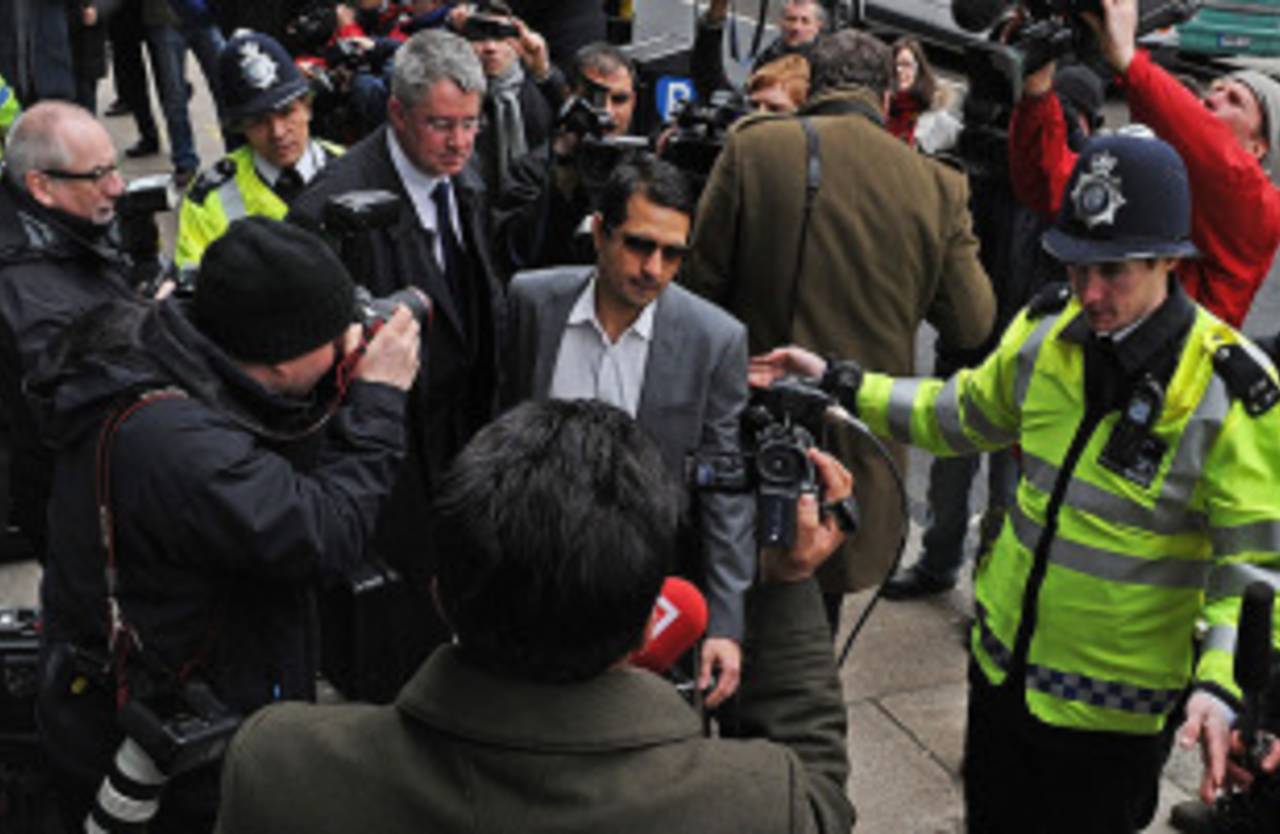Ringside at the biggest cricket trial of them all
Outside the courtroom, it was all informal and laidback, but in it things were deadly serious, and never more than on the day Mohammad Amir showed up
Richard Sydenham
Nov 5, 2011, 3:15 AM

Courtroom reporting: not quite the same as sitting in the press box at a ground • AFP
For a cricket journalist, it was a strange feeling to walk into Southwark Crown Court a month ago to cover a criminal trial. The fact that it involved cricketers, players I knew, helped to bring some familiarity, along with a sprinkling of media people I also knew, but still it was a little weird.
I'm used to working at places like Trent Bridge and Lord's, writing lunch and tea reports, maybe the odd disciplinary or failed drug test if things become serious. This was something else. I had not been in a courtroom since my journalism training almost two decades ago, when I had to observe a road rage case. The defendant then was sentenced to a month in prison for assault. I never expected to witness anybody else being sent to jail - especially famous cricketers.
As we now know, Salman Butt, Mohammad Asif and Mohammad Amir, and agent Mazhar Majeed, were given stiff custodial sentences on Thursday morning, the 22nd day of the trial. That inevitably sparked frantic reaction through the world - and not just the cricket world.
I had a taste of what to expect when I wandered out of the third-floor lift and into the corridor outside the courtroom on the day of the sentencing. Crowding, barging and shoving for priority seats. Back in the early days I had to remind myself at times that this was a criminal trial, such was the relaxed nature of the proceedings outside the courtroom.
For mid-morning breaks or at lunch, Butt and Asif would wander out of the dock and take a stroll outside or go and grab some lunch in the canteen on the first floor. Asif would ask me or colleagues of mine to buy him a bottle of freshly squeezed orange juice when he left the building for a cigarette. (He always offered to pay.) On a lunch break the former swing bowler supreme would buy some chips and baked beans from the canteen and talk freely. Asif is down to earth, open and likeable, though us media types were a little uncomfortable sometimes when he wanted to discuss proceedings. A change of subject was called for. Even only 20 minutes before he was found guilty by the jury, Asif was sitting with his friend, myself and a colleague from Sky Sports, playing games on her iPad. It would be wrong to conclude he didn't care, or wasn't worried by the case; it was just his way of dealing with it, I suppose.
Butt usually spent break times with his lawyers. His was a more serious, closed personality, anyway, but he was always courteous and would often reminisce about tours we had previously been on together. Maybe the truth was that we were two people seeking a conversation with which we were both more comfortable, while in an environment we were clearly unaccustomed to.
Even only 20 minutes before he was found guilty by the jury, Asif was sitting with his friend, myself and a colleague from Sky Sports, playing games on her iPad
The laidback nature of everything could give the impression the case was not all that serious; that notion, though, was dispelled every time proceedings resumed. Any banter or small talk was forgotten when you entered the courtroom. As I would take my seat and begin reporting on the proceedings, the players would be back in the enclosure of the dock, shielded from the room by a thick Perspex screen.
Early on I was grateful for the guidance of lawyers and regular court reporters, who would advise on what we could and could not publish. I knew this assignment would be a challenge, given it was a departure from what I was accustomed to. One case heard by Justice Cooke before the spot-fixing proceedings commenced centred on a web journalist who had broken reporting restrictions and was in contempt of court. I satisfied myself privately after a month of covering the trial that I had not ended up in the same position.
When Amir and Majeed arrived on the scene on Day 21, the day before sentencing, the magnitude and atmosphere of the case changed once more. The two extra teams of lawyers moved in, more press and public came along. You felt a high-profile, dramatic conclusion was near.
One of the saddest aspects for me was the sight of Amir. Here was a youngster I had got to know in 2009 and then 2010, who had an infectious smile, a boyish charm, and obviously great skills on the field. Understandably there was no smile now - little emotion, in fact, just a serious, downbeat look. When he picked up his bag to leave for the holding cell after sentencing, it brought home the tragedy of the whole affair.
Journalists have a job to do, as do lawyers, and indeed judges. But despite our functionality and focus, it doesn't mean we don't care when people we write about suffer. In this case, the players did wrong; they broke the law and manipulated what is supposed to be a natural, fair sporting contest. Whether they merited a prison sentence is debatable. Some of us took little pleasure out of writing such headlines.
Richard Sydenham has been covering the spot-fixing trial for ESPNcricinfo